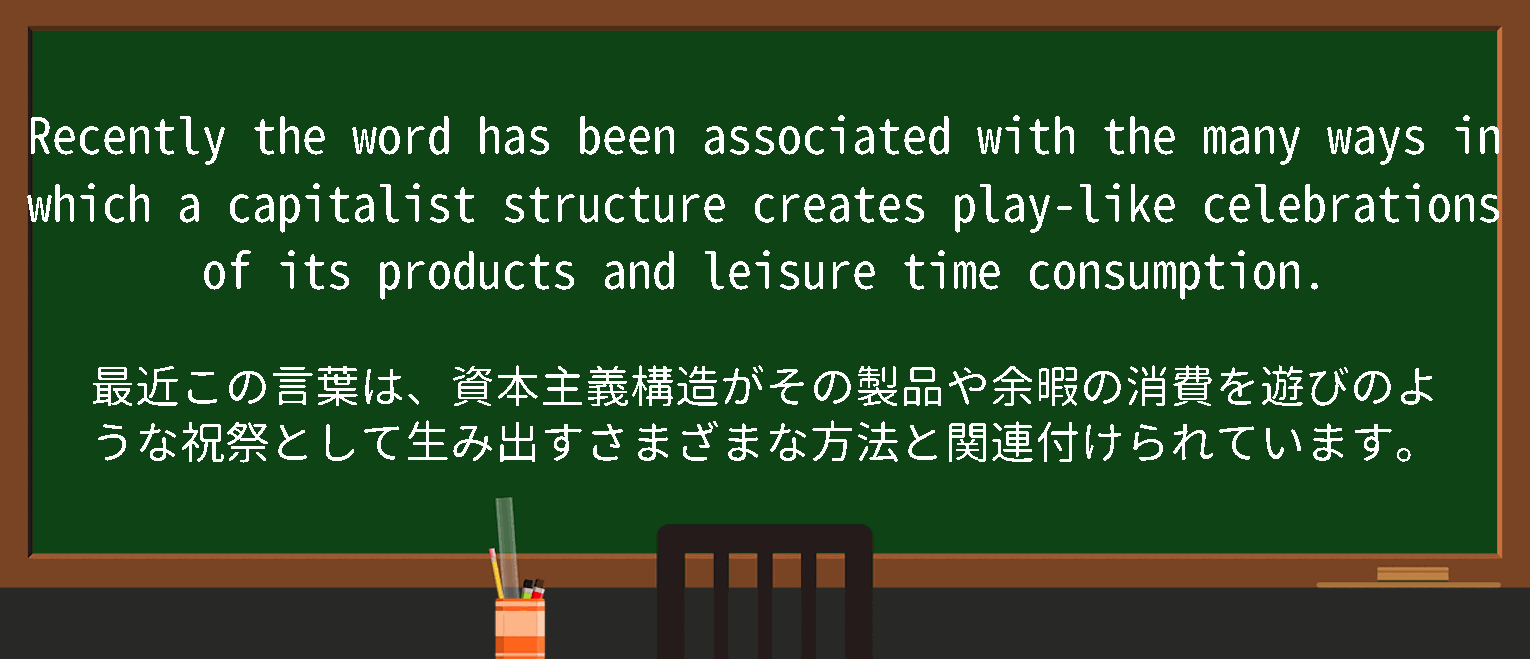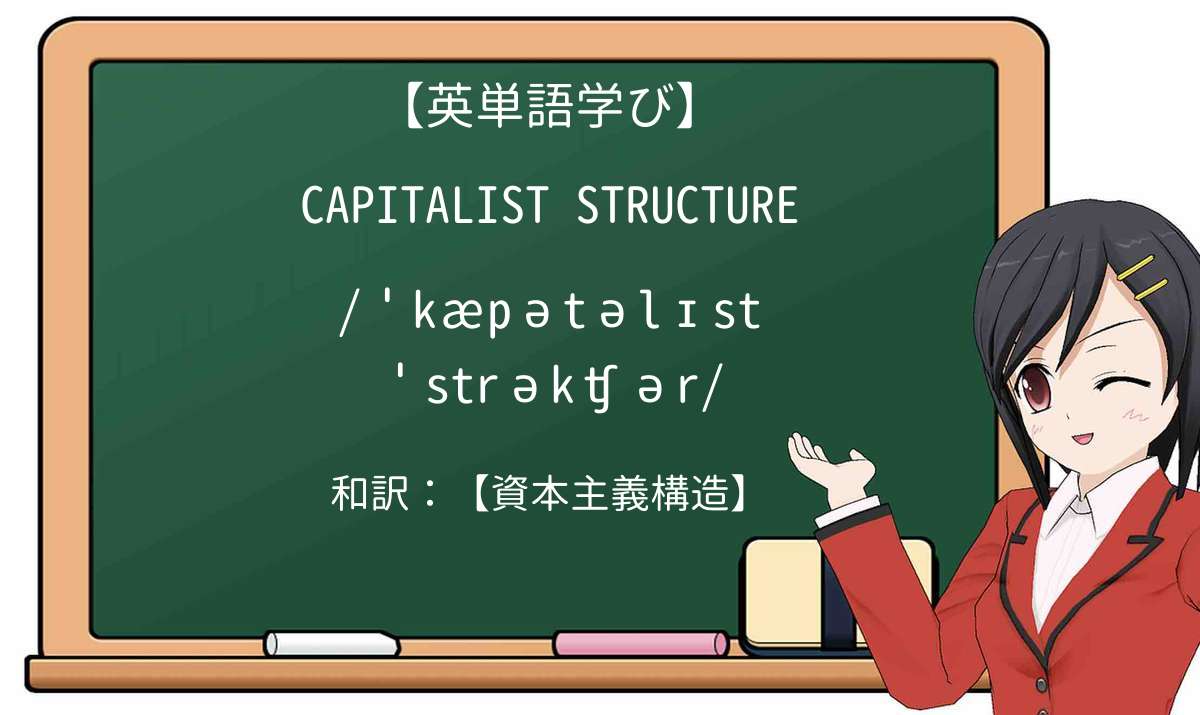capitalist structureの意味について
「 capitalist structure 」は2つの英単語( capitalist、structure )が組み合わさり、1つの単語になっている英単語です。
- 「 structure 」は【何かの部分が配置されたり、組み合わされたりする方法】意味として使われています。
- 「 capitalist 」は【資本主義(=利益を上げることを目的として、国家ではなく私有者が財産、事業、産業を支配する経済政治システム)を支持する人】の意味として使われています。
意味:【資本主義構造】
参考:「capitalist structure」の例文一覧

「capitalist structure」のネイティブ発音(読み方)を聞きましょう!
読み方は【ˈkæpətəlɪst ˈstrəkʧər】です。下記動画を聞きながらˈkæpətəlɪst ˈstrəkʧərを大声で発音しましょう
【絶対聞こう】アメリカ人が「capitalist structure」の意味について解説】!
capitalist structureの実際の意味・ニュアンスを理解して、正しく使いましょう!
Then, to deliver fundamental changes to the
structure
of
capitalist
economies, he introduced the concept of “social business” during the awards ceremony for the Nobel Peace Prize in 2006.This concept included a number of projects that started with microcredit.
そして、マイクロクレジットから始まったさまざまな取り組みを包含し、
資本主義
経済の
構造
に根本的な変化をもたらすことができる新しい概念として、ノーベル平和賞受賞式典(2006年)においてはじめてソーシャル・ビジネスという言葉を使いました。
Neoliberalism and Art The reason I have been discussing the modern
capitalist
society and the
structure
of discrimination and configuration of gender that results from it is that I believe it forms an important perspective for considering art today.
新自由主義と芸術 なぜ私がここで近代
資本主義
社会とそこに起因するジェンダー配置や差別の
構造
について語っているかと言うと、それが現在のアートの現場を考える上で重要な視点になると考えるからなのです。
Another thing is, it turns out, those resources don’t usually come from the places you might expect – banks, venture
capitalists
, other organizations and support
structures
– they come from friends and family.
もう一つ わかったことは その資金の出どころは銀行でも ベンチャー
キャピタル
や 各種組織や支援
機構
でもなく 友人や家族から得ているのです
This led to the birth of a new class
structure
comprising the
capitalist
who owned the factory and the people who worked at the factory.
工場を所有する
資本家
と、工場に出勤して働く労働者という新しい階級
構造
の誕生です。工場で生産された商品を売ることで売上が生じます。
It depicts through animation and experimental techniques the complicated social
structure
the Chilean youth found themselves in-with its
capitalists
and laborers, wealthy and poor, right wing and left.
資本家
に労働者、富裕層に貧困層、右翼に左翼と、チリの若者を取り巻く複雑な社会
構造
を、アニメーションや実験映像の手法を用いて描き出す。
Moreover, the disputes, ranging from legal theories to contradictions of
capitalist
economy, national ideology and positioning of the national
structure
and so on and combined with the disputes over the Commercial Code, came to present a kind of political confrontation.
また論争は法律論にとどまらず
資本主義
経済の矛盾の問題、国家思想や
国体
の位置づけなどにも及び、商法典論争と相まって一種の政治対立の様相さえ呈するようになった。
Countries have been manipulated by financial
capitalists
represented by Wall Street, and as a result of being led to liberalize people, goods, and money, nations’
structures
have been destroyed, leaving those nations in the miserable situations they find themselves in now.
ウォール街に代表される金融
資本家
に踊らされて、人、モノ、金の自由化に踊らされた結果、国体を破壊され今の悲惨な状況となった各国。
In a
capitalist
society, public finance, household budgets and companies should be operated based on the principle of periodical profit and loss.The problem lies in a mechanism (
structure
) in which they cannot control liabilities and this results in the further accumulation of liabilities.
Because one thing is clear: Our idea of a degrowth economy is not to shrink the economies within the existing economic and social
structures
and distributory relations – this would lead to massive social cutbacks, poverty and other symptoms of
capitalist
crisis, such as we are currently experiencing.
As to the problem of money , which all
capitalist
countries know, without exception, it is inherent to the
structure
of the trading of money, which includes all of its aspects, from administration, management, guarantees, etc., up to and including the issuing of money.
The materialism (historical materialism) applied to what Uno calls human society is the following thing: “We intend to clarify the economic laws which in general run through
capitalist
society.We attempted to systematize the process of socio-material metabolism of a perfectly capitalistic
structure
… This was intended to elucidate the economic laws of
capitalist
society, and the fact that this is manifested as an independent materialistic process.”
The bakumatsu can be described as the period in which the feudal system characteristic of the shogunage by the head of the Tokugawa family collapsed, or the period in which the social
structure
dramatically changed as the country abolished the long-held closed-door policy and started trading with foreign countries, eventually becoming a member of the global
capitalist
market economy.
